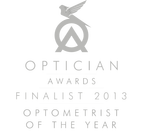The eyes are complex structures made up of thousands of components working together to provide vision.
An eye examination allows many of these components to be tested to ensure they are working within the normal range.
The eye examination itself has also moved on with technological advances in screening and assessment.
At Templeman Opticians - Laindon we invest in the latest equipment to provide patients with the option of a comprehensive eye examination. Call us for more information or to book an appointment 01268544646.
An eye examination allows many of these components to be tested to ensure they are working within the normal range.
The eye examination itself has also moved on with technological advances in screening and assessment.
At Templeman Opticians - Laindon we invest in the latest equipment to provide patients with the option of a comprehensive eye examination. Call us for more information or to book an appointment 01268544646.
|
Computerised Test Chart - this is displayed on a 1080p screen and allows a diverse range of visual assessment charts to be used.
|
Visual Field Analyser – our new ZEISS Humphrey Field Analyser 3 is the latest visual field analyser offered by ZEISS. The Humphrey Field Analyser has been, and continues to be, the preferred device used by hospitals to measure visual fields. As a significant investment it takes pride of place in the practice.
|
OCT Wellness Scanning - Your eyes can now be examined in previously unimaginable detail using our Optopol Revo FC high definition retinal scanner.
It is non-invasive, painless and quick! The images are stored for future reference, and compared to monitor the health of your eyes. |
The Eye Examination
During the eye examination, you will be asked a number of questions to enable the optometrist to build a picture of your vision needs and address eye-related queries. Some time will be spent on these questions.
An important part of an eye examination is the sight test and your vision will be assessed and recorded using our latest computerised test chart.
Some of the procedures in finding your spectacle prescription are carried out by the optometrist objectively (using their skill without patient input). Others tests will require a little input from you - rest assured there are no right or wrong answers. However, the final result is in the hands of our optometrist.
After optimising your vision, the optometrist will examine the health of your eyes. There are a number of instruments that may be employed for this and each optometrist will have their own preferred method. The newest instrument we have is the ZEISS Humphrey Visual Field Analyser. Installed in 2017 this device can provide hospital grade visual field analysis to detect conditions like glaucoma more effectively.
Our team can also take an image of the retina using the OCT Scanner. This high resolution scanning device provides further information on the health of the eye, as well as provide the optometrist with baseline data to use against future images.
The optometrist will then discuss their findings with you 'point by point' at the end of the examination. You are encouraged to ask any questions. This is an important time in ensuring your satisfaction. If spectacles are recommended you will be personally handed over to a member of our dispensing team to help with frame selection. The optometrist or dispensing optician will then help with lens selection ensuring you are aware of the benefits with the options you are given. Once again we encourage questions to enable you to make the best decisions about your eyecare - after all these are your eyes and they deserve the best.
During the eye examination, you will be asked a number of questions to enable the optometrist to build a picture of your vision needs and address eye-related queries. Some time will be spent on these questions.
An important part of an eye examination is the sight test and your vision will be assessed and recorded using our latest computerised test chart.
Some of the procedures in finding your spectacle prescription are carried out by the optometrist objectively (using their skill without patient input). Others tests will require a little input from you - rest assured there are no right or wrong answers. However, the final result is in the hands of our optometrist.
After optimising your vision, the optometrist will examine the health of your eyes. There are a number of instruments that may be employed for this and each optometrist will have their own preferred method. The newest instrument we have is the ZEISS Humphrey Visual Field Analyser. Installed in 2017 this device can provide hospital grade visual field analysis to detect conditions like glaucoma more effectively.
Our team can also take an image of the retina using the OCT Scanner. This high resolution scanning device provides further information on the health of the eye, as well as provide the optometrist with baseline data to use against future images.
The optometrist will then discuss their findings with you 'point by point' at the end of the examination. You are encouraged to ask any questions. This is an important time in ensuring your satisfaction. If spectacles are recommended you will be personally handed over to a member of our dispensing team to help with frame selection. The optometrist or dispensing optician will then help with lens selection ensuring you are aware of the benefits with the options you are given. Once again we encourage questions to enable you to make the best decisions about your eyecare - after all these are your eyes and they deserve the best.


